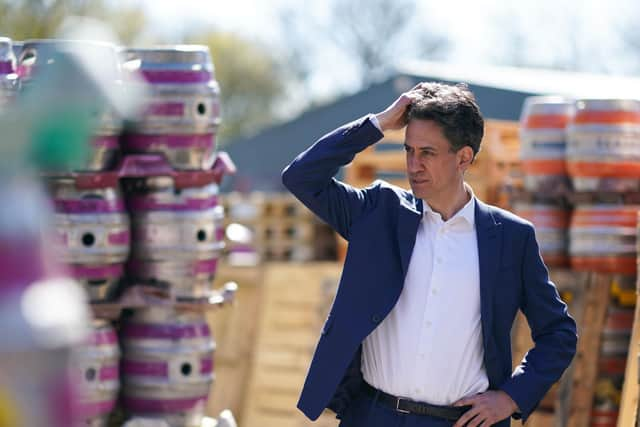Ed Miliband says public inquiry into coronavirus must examine why poorer areas of Yorkshire were amongst hardest hit
The Doncaster North MP says there is a "lot of evidence" that issues such as inequality, deprivation and poverty are among the reasons for the country's high death toll and why many areas of Yorkshire still have among the highest case rates in the country.
The latest figures show that although case rates have been falling steadily since the start of the third lockdown, Doncaster currently has the highest rate per 100,000 people in the country.
Advertisement
Hide AdAdvertisement
Hide Ad

In the seven days to April 19 its rate of new cases per 100,000 people was 68.6, down from 88.2 a week earlier. Kirklees has the third highest rate, Barnsley the sixth and Bradford the ninth.
Earlier this week, Mr Miliband's fellow Yorkshire Labour MP Jon Trickett led a Westminster Hall debate where he said local infection rates are "still raging" because people in the region are more likely to have to leave the house to work.
And the Hemsworth MP says the Government should deploy 'rapid response teams' to areas with high infection rates so local health groups can tailor their response more effectively.
On a visit to Ilkley this week, Mr Miliband said there were specific issues in Doncaster and the more transmissible Kent variant arrived later in the borough than elsewhere.
Advertisement
Hide AdAdvertisement
Hide AdBut he said there were underlying issues of deprivation and the fact that people were less likely to work from home in Yorkshire "I think must be part of the explanation why we're seeing higher rates".
He told The Yorkshire Post: "Overall, there's a deeper thing here which is when this inquiry finally does happen into Covid, of course it's got to be about the judgements the government made about when they went into lockdown and all that, but it's also about these deeper questions of deprivation and inequality.
"Because there's certainly a lot of evidence and a lot of people saying that one of the reasons that we as a country as a whole, and particular parts of our country have really faced such tough times, is because of the levels of inequality deprivation or housing."
Prime Minister Boris Johnson has come under pressure to hold a public inquiry into why the death toll from coronavirus in the UK was among the highest in the world. He said he was "of course committed" to holding an inquiry "as soon as it's right to do so".
Advertisement
Hide AdAdvertisement
Hide AdAsked when he thought any inquiry should be held, Mr Miliband said: "The danger is, they just want to keep putting it off. I mean in a sense, it's just got to happen, it's got to happen, and it's got to be thorough. So when exactly that is can be a matter of debate, but it does have to happen.
"It's got to be thorough, it's got to be independent, it's got to really seek to learn lessons. If they're uncomfortable lessons they've got to be learned."
Meanwhile, the Government said a further 40 people had died within 28 days of testing positive for Covid-19 as of yesterday, bringing the UK total to 127,385.
Separate figures published by the UK's statistics agencies show there have been 151,000 deaths registered in the UK where Covid-19 was mentioned on the death certificate.
Advertisement
Hide AdAdvertisement
Hide AdThe Government also said that, as of 9am yesterday, there had been a further 2,678 lab-confirmed cases in the UK. It brings the total to 4,401,109.
Government data up to April 22 shows that of the 45,012,308 jabs given in the UK so far, 33,388,637 were first doses - a rise of 130,986 on the previous day.
Some 11,623,671 were second doses, an increase of 431,070.
A Department of Health and Social Care spokesperson said: "Protecting communities and saving lives is always our first priority.
“Workplaces across the country have been able to register for free, rapid Covid testing to break chains of transmission and protect those who cannot work from home.
“Our vaccination programme continues to make phenomenal progress – with over 43 million vaccines administered so far – reaching every part of the UK.”
Comment Guidelines
National World encourages reader discussion on our stories. User feedback, insights and back-and-forth exchanges add a rich layer of context to reporting. Please review our Community Guidelines before commenting.
